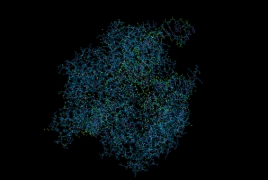Gene editing could lead to a cure for HIV March 23, 2016 - 13:35 AMT PanARMENIAN.Net - While antiretroviral drugs do a good job of keeping HIV infections under control, scientists are working hard to come up with a full cure for the condition. A team of researchers from the Lewis Katz School of Medicine at Temple University is making real progress in that regard, successfully testing a gene editing system, demonstrating its ability to eliminate the virus from DNA in human cells grown in culture, Gizmag reports. Since it was first discovered in the 1980s, HIV and AIDS has caused in excess of 25 million deaths. Antiretroviral drugs are effective at controlling the infection, but if patients stop having the treatment, the infection quickly takes hold and health deteriorates rapidly. Finding a cure is problematic, as it's difficult to eradicate the virus once it's integrated into CD4+ T-cells – the primary cells infected by HIV, Gizmag says. Some recent attempts to find a cure have focused on actually reactivating the virus to prompt a strong immune response to kill it, but no study has yet yielded positive results. The Temple University team's approach is more subtle, using CRISPR/Cas9 gene editing technology to target and remove the virus from DNA. The tech is made up of a guide RNA, which is used to locates the HIV-1 virus in the DNA, and a nuclease, which is then able to edit it out of the sequence. Once the virus is eliminated, the cell's own mechanisms step in and tie up the loose ends of the genome. Working with T-cells from patients infected with HIV-1, grown in culture, the researchers were able to demonstrate the technology removing the virus, and continuing to protect against further infection following the treatment, Gizmag says. The researchers also looked at whether the treatment had any off-target effects, or caused any toxicity – an essential investigation should the technology ever be widely used. Analyzing cells following the treatment, the team used ultra-deep whole-genome sequencing to determine that no off-target effects had occurred, including any potential changes to the gene expression of the cell. Observations of the cells showed them to be growing and functioning in a healthy manner. The results provide the most complete set of data on the pioneering new treatment, and while widespread use is still a long way off, the researchers can now move ahead with the technology, working towards a full cure for HIV. The number of state universities will be reduced from 23 to 8 by 2030, Minister of Education, Science, Culture and Sport Zhanna Andreasyan has said. From September 21 to November 11, a total of 2,820 Russians registered at a place of residence in Armenia, the police has said. The situation on the contact line between Karabakh and Azerbaijan was relatively stable overnight, the Defense Army says. Defense Minister Suren Papikyan has visited the southern Armenian province of Syunik, the Defense Ministry reported on March 18. Partner news |